

Can Everyone Be Smart at Everything? Recent studies question the theory of native intelligences.

If they have to work hard, does that mean they're not smart? When a student gets a good grade, wins an award, or proudly holds up a painting, we all know by now that we’re not supposed to say, “Good job!” Praising the achievement rather than the effort will backfire. To a kid, “Good job” means “You’re smart” or “You’re talented” — the praise goes to inherent, natural-born abilities or intelligence. But that immediate spark of self-pride will turn into deep self-doubt when the child invariably comes across a bigger challenge and doesn’t immediately succeed. Kids who are praised for their intelligence end up caring more about grades, trophies, and awards than those who are praised for their effort, according to the famous 1998 Stanford report “Effects of Intelligence and Effort Praise” by Claudia Mueller and Carol Dweck.
Struggle Means Learning: Difference in Eastern and Western Cultures. By Alix Spiegel In 1979, when Jim Stigler was still a graduate student at the University of Michigan, he went to Japan to research teaching methods and found himself sitting in the back row of a crowded fourth-grade math class.
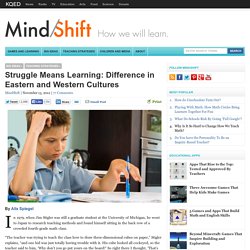
“The teacher was trying to teach the class how to draw three-dimensional cubes on paper,” Stigler explains, “and one kid was just totally having trouble with it. His cube looked all cockeyed, so the teacher said to him, ‘Why don’t you go put yours on the board?’ So right there I thought, ‘That’s interesting! He took the one who can’t do it and told him to go and put it on the board.’ ” Stigler knew that in American classrooms, it was usually the best kid in the class who was invited to the board. In Japanese classrooms, teachers consciously design tasks that are slightly beyond the capabilities of the students they teach, so the students can actually experience struggling with something just outside their reach. But the kid didn’t break into tears. Power Notes. Classroom Strategies Download a Graphic Organizer Word Doc (106 KB)PDF (144 KB) Background.
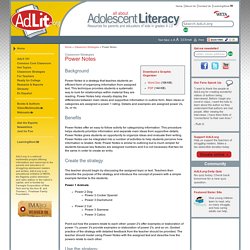
How to Help Your Student Develop Scheduling Skills. Whether a student is enrolled in a virtual or brick-and-mortar school, he or she will have to develop scheduling skills that help with prioritizing schoolwork.
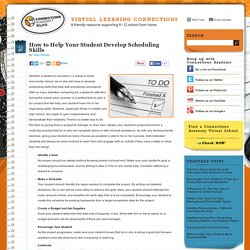
With so many activities competing for a student's attention during the school year, summer is a perfect time to plan a fun project that will help your student hone his or her organizing skills. Students, especially those in middle and high school, are eager to gain independence and demonstrate their reliability. 5 Steps toward Independence in High School.
If you’re ready to start the next phase of your education—and life—in high school, then you have plenty to anticipate.

High school is a time when you can have fun, expand your interests, and gain new responsibilities. In other words, high school is when you start transitioning into adulthood. Uncovering the Reason for Underachieving. Is your student not working up to his or her full potential?

You recognize the signs: constant complaints, procrastination, and poor performance. Whether underachieving is an ongoing problem or a new trend for your child, it’s a normal experience—in fact, struggling is a predictable part of the learning process. “I think that from very early ages we [in America] see struggle as an indicator that you’re just not very smart,” says Jim Stigler, a professor of psychology at UCLA. “It’s a sign of low ability—people who are smart don’t struggle, they just naturally get it, that’s our folk theory. Whereas in Asian cultures they tend to see struggle more as an opportunity.” Western cultures often think of struggling as a negative, but Asian cultures view struggling as an opportunity to learn and persevere.
Dancing with Procrastination. "Did you get your essay done?

" My daughter is procrastinating again. I start probing to find out why she just spent 20 minutes meticulously drawing out a perfect smiley face on the back of her hand. I put my Learning Coach hat on and begin a careful line of questioning. Inspire Students with Positive Quotes. There are countless ways to motivate your student to learn.
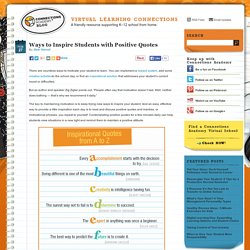
You can implement a reward system, add some creative activitiesto the school day, or find an inspirational solution that addresses your student’s current mood or difficulties. But as author and speaker Zig Ziglar points out, “People often say that motivation doesn’t last. Daydreaming Is an Essential Part of Learning. If you’re fighting a tendency to daydream, you may want to reconsider.

Recent research suggests that daydreaming is actually an essential part of our learning process. Neuroscientists at the University of British Columbia (UBC) discovered that, when we daydream, two essentially “opposite” parts of the brain are activated, “allowing two otherwise opposing networks to work in cooperation.” This unusual state of cooperation lets us make connections and reach conclusions that elude us when we’re focused on a specific task.
In fact, in a Wall Street Journal article, the researcher says that daydreaming “is a much more active state than we ever imagined, much more active than during reasoning with a complex problem.” 6 Keys to Develop Independent Study Skills. Watching your child’s education develop before your eyes is a truly gratifying experience.
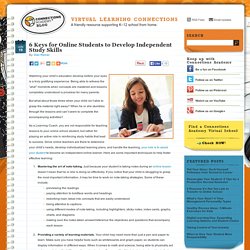
Being able to witness the “aha!” Moments when concepts are mastered and lessons completely understood is priceless for many parents. But what about those times when your child isn’t able to grasp the material right away? When he or she stumbles through the lessons and can’t seem to complete the accompanying activities? 5 Key Skills You Need (As a Student) While changing from a traditional school to a virtual school gives families more control over their children’s education, there can be significant adjustments. Coming from a traditional school culture, kids may not have the skills or the mind-set needed to take full advantage of online school’s many benefits.
As a Learning Coach, you can help your child succeed by providing extra support and guidance during the transition period. Teaching or reinforcing the following skills with your children will help them catch on quickly and get a strong start in online learning. Navigating on a computer. 5 Tips to Kick-Start Virtual Learning. The second semester is already underway and now is the perfect time to sit down with your student to discuss academic resolutions for the new semester.
Here are a few suggestions to help you make the virtual learning experience as rewarding as possible: Set goalsYour job as a Learning Coach is to help your student(s) set goals appropriate for their growth, confidence, and happiness. Virtual schools provide teachers and school counselors who support your student, so be sure to include them in your plan to reach those goals and measure progress.
Keep in mind that kids usually have their own aspirations, so giving them the chance to set their own goals can teach them independence and responsibility. Don’t forget to celebrate successes along the way. Tips to Increase Student Focus. Imagine being a student, staring out the window at a beautiful sunny spring day, knowing how much fun is to be had out there! How can schoolwork compete with Mother Nature?
Well, if you school at home, it doesn’t necessarily have to! Springtime offers plenty of opportunities to pull nature into daily lessons. 7 Creative Ways to Motivate VS Students. Wondering how to help motivate your student at the start of the new school year? It’s common for all students, whether attending homeschool, virtual school, or traditional school, to lose motivation from time to time—and this can be a source of stress and strain. Over the years, many experienced homeschool parents and virtual school Learning Coaches have shared with me their own personal strategies for keeping students excited about learning.
Now you can also combat difficult academic challenges, waning self-discipline, and slipping enthusiasm with their ideas below (and thanks to all you experts out there!) : Starting Strong: Organization Tips for New Online Learning Coaches > Virtual Learning Connections. Eye-Friendly Computer Tips. In today’s high-tech world, children are surrounded by smart phones, game systems, tablets, laptops, and desktop computers. Be sure that as a parent, you teach and practice positive habits for using electronic “gadgets” to help your kids learn how to maintain good eye health. In our final vision-related blog post for Children’s Eye Health and Safety month, you’ll find hints from the American Optometric Association for eye-friendly computer use for your children and yourself.
Do a screen test. Check your children’s computer monitor to be sure it’s set up for high resolution, as well as for appropriate brightness and contrast, which provide maximum sharpness of screen images, particularly for reading text. Adapt for the vertically challenged. I hope you find these suggestions helpful. Do you have any effective, creative ideas for pulling kids away from computers and videogames without a fight? 5 Great Organization Tips. Lessons, portfolios, and assessments, oh my! Call Me (Maybe) Parody (VS) Our Favorite Classroom Organization Ideas. Break the Multitasking Habit with These Study Tips. Developing Soft Skills. 6 Stress Management Tips. Your class assignment is due in an hour.
Your Internet connection is down. Identify Your Educational Philosophy. Through my experiences as both a homeschool parent and an online school Learning Coach, I have realized the importance of identifying your educational philosophy. 5 Elements of Student Motivation in Virtual School. This is a guest post by Sarah Fudin who currently works in community relations for the University of Southern California Rossier School of Education’s online master’s programs. USC Rossier Online provides current and aspiring teachers the opportunity to earn a Master’s of Education and also provides the necessary skills for becoming a teacher. Outside of work, Sarah enjoys running, reading, and eating Pinkberry frozen yogurt. Parents choose to enroll their children in virtual schools for a number of reasons. Virtual School DREAM. “I have a dream,” said Martin Luther King, Jr., in his most famous speech, “that my four little children will one day live in a nation where they will not be judged by the color of their skin but by the content of their character.”
Teens, Sleep, and School Schedules. Go to sleep late. Wake up early. Drag through the school day tired, unfocused, and cranky. Unfortunately, that’s the typical scene for the nation’s chronically sleep-deprived teens caught between their changing biology-driven sleep cycles and their traditional schools’ unchanging logistics-driven early school hours. Time Management 101. How Students Can Achieve Goals: Setting Deadlines. Strengthening Your Child’s Resolve: Achieving Resolutions. Note-Taking Tips. Stop Digital Eye Strain in the Virtual Classroom. 4 Sample Daily Schedules for Virtual School Families.
What’s Your Style? 4 Time Management Personality Types. Maintaining Motivation. Virtual School Family Planner (Part 1)